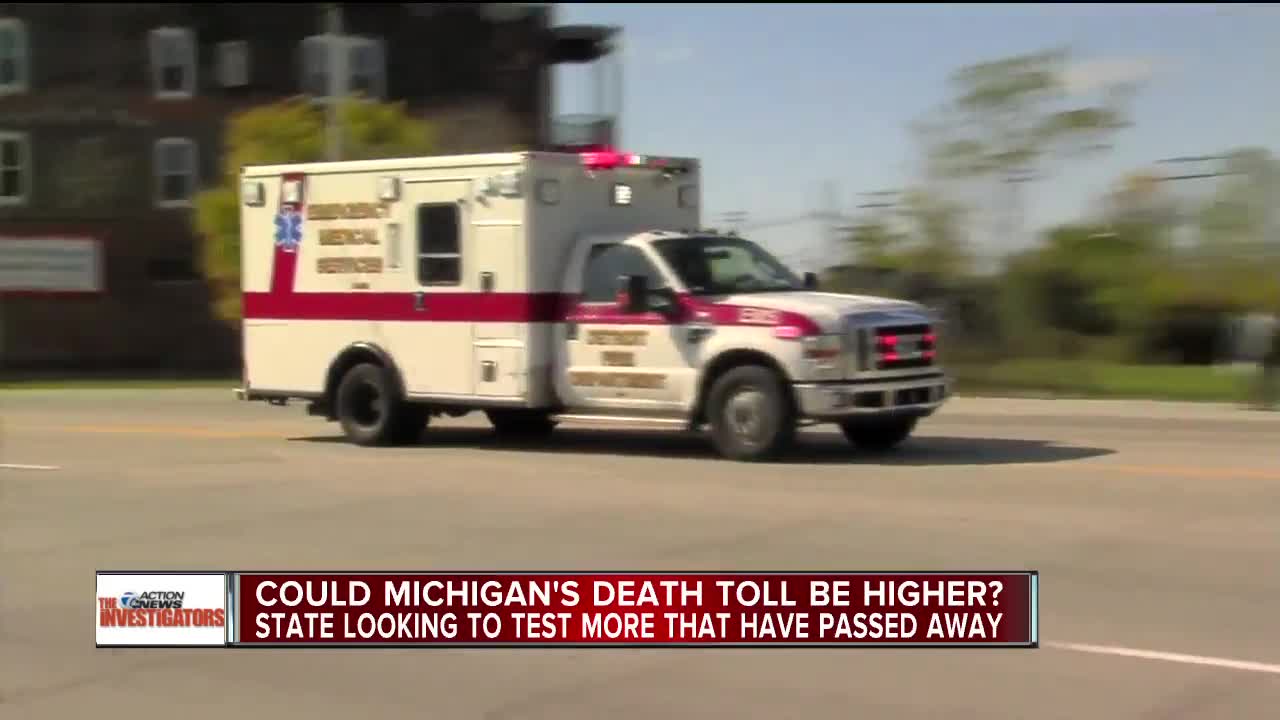(WXYZ) — Following a recommendation from the Center for Disease Control, the Michigan Department of Health and Human Services will begin tracking "probable" COVID-19 deaths and cases next week — a move aiming to more accurately reflect, and respond to, the impact of coronavirus in the state.
"This is going to give us a much more complete picture of what is happening in our state" said Lynn Sutfin a spokesperson for the department, who explained that MDHHS will utilize health departments, the state’s Disease Surveillance system and vital records to track cases where a coronavirus association is recorded but no confirmation testing has been done.
"We do know that there have been individuals who have passed that didn’t not get that opportunity for that test," she continued.
As of Friday the state has seen over 2,000 "confirmed" COVID-19 deaths. This new goal of tracking "probable" cases will likely inflate this number. But also more accurately reflect the impact of the virus, as well as what first-responders and the community are seeing on the streets: a spike in deaths at home.
"There’s been an uptick, that’s very noticeable in the Code 7s that we’re getting," said William Harp, the vice president of the Detroit Firefighters Association, referring to the shorthand used for "dead on arrival" calls.
"Generally we would do a number of them in a day, that really wasn’t excessive and now it seems like we’re getting lots of them," he continued.
According to Harp there are "two schools of thought" around this trend. Either the deaths are being caused by COVID-19. Or they being caused by serious pre-existing conditions that the individuals are afraid to get taken care of because they don't want to engage with the hospital system during this crisis.
"It's noticeable," he said.
The observation was reiterated by the Hamtramck Police Department, who shared DOA data with 7 Action News. While the department saw 8 dead on arrival cases between March 1 and April 15 of this year, they only had one such case during the same time frame in 2019; a 700% increase. Additionally, a new report from ProPublica found that in the first 10 says of April Detroit authorities responded to 150 Code 7s, versus only "around 40" during the period the three years prior.
The tracking of these probable cases by MDHHS is an attempt to bridge these gaps.
"[It's] providing us with a full-picture of the severity of this disease," said Sutfin.
This demand for increased data is not new. Oakland County Medical Examiner Dr. Ljubisa Dragovic has been at the forefront in this push, taking the unprecedented step back in March to begin testing bodies brought to his morgue.
"It's important to have every bit of detail from each and every angle that can be put in this major jigsaw puzzle in order to adequately handle this future," he said.
The MDHHS does not plan to track probable COVID-19 deaths retroactively.
Additional Coronavirus information and resources:
Read our daily Coronavirus Live Blog for the latest updates and news on coronavirus.
Click here for a page with resources including a COVID-19 overview from the CDC, details on cases in Michigan, a timeline of Governor Gretchen Whitmer's orders since the outbreak, coronavirus' impact on Southeast Michigan, and links to more information from the Michigan Department of Health and Human Services, the CDC and the WHO.
View a global coronavirus tracker with data from Johns Hopkins University.
Find out how you can help metro Detroit restaurants struggling during the pandemic.
See all of our Helping Each Other stories.
See complete coverage on our Coronavirus Continuing Coverage page.


